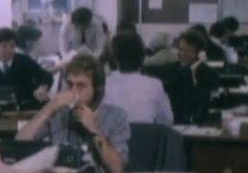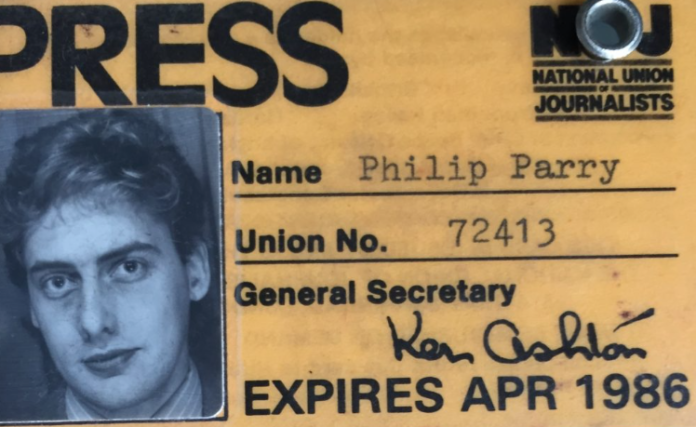- ‘Lies, damned lies etc…’ - 13th February 2026
- Missing in action - 12th February 2026
- Travel news again - 11th February 2026

During 23 years with the BBC, and 40 years in journalism, our Editor Welshman Phil Parry has seen enormous changes in society – particularly in attitudes towards gay people as well as immigrants – and this is now underlined by new figures which show that the UK has liberalised more over the last thirty years than at any other point in its history.
Earlier Phil has described how he was helped to break into the South Wales Echo office car when he was a cub reporter, recalled his early career as a journalist, the importance of experience in the job, and making clear that the‘calls’ to emergency services as well as court cases are central to any media operation.
 He has also explored how poorly paid most journalism is when trainee reporters had to live in squalid flats, the vital role of expenses, and about one of his most important stories on the now-scrapped 53 year-old BBC Wales TV Current Affairs series, Week In Week Out (WIWO), which won an award even after it was axed, long after his career really took off.
He has also explored how poorly paid most journalism is when trainee reporters had to live in squalid flats, the vital role of expenses, and about one of his most important stories on the now-scrapped 53 year-old BBC Wales TV Current Affairs series, Week In Week Out (WIWO), which won an award even after it was axed, long after his career really took off.
Phil has explained too how crucial it is actually to speak to people, the virtue of speed as well as accuracy, why knowledge of history and teaching the subject is vital, how certain material was removed from TV Current Affairs programmes when secret cameras had to be used, and some of those he has interviewed.

He has disclosed as well why investigative journalism is needed now more than ever although others have different opinions, how the coronavirus (Covid-19) lockdown played havoc with media schedules, and the importance of the hugely lower average age of some political leaders compared with when he started reporting.
The only thing you can be certain of is that things will change.
Let’s take, for example, our attitudes towards gay people first.
When I started in journalism in 1983 on what was then the biggest-selling paper produced in Wales (the South Wales Echo [SWE]), it was a major story if someone was afflicted by AIDS.

I remember distinctly waiting in a car outside the Cardiff home of one poor person who was battling against this terrible disease, to see if a family member or friend would give me an interview.
In the newsroom the reporter next to me would disinfect her telephone every time one person came to use it who was known to be gay, using plastic gloves to do it, such was her ignorance and bigotry towards the condition.

One of the copytakers on the SWE related a ‘joke’ to me that was doing the rounds then – that AIDS stood for ‘Arse Injected Death Serum’.
How I laughed!
Not…
Now, thankfully, all this has changed.

According to a survey led by Bobby Duffy of King’s College London between 1990 and 2022 the share of Britons who said they wouldn’t live next door to someone with AIDS fell from 23 per cent to just FOUR per cent!
Meanwhile the British Social Attitudes (BSA) survey shows that backing for same-sex relationships has soared.


David Furnish – people love shows of love
You only have to look at the outpouring of support for Elton John marrying his partner David Furnish to know that is true.
People adore public displays of love. They become all misty eyed after seeing two people of whatever sex getting married.
It seems that the spread of Higher Education (HE) may have helped.

In 2018 application rates to get on HE courses from English 18 year olds reached a record high, increasing by 0.4 percentage points to 37.4 per cent, and even last year it was 35.8 per cent.
The application rate for 18 year olds in Wales also increased by 0.3 percentage points to 32 per cent, rates in Northern Ireland were stable at 47.5 per cent, and they were more than 32.5 per cent in Scotland even through the main admissions process when huge numbers are not admitted that way.

In 1980 the percentage of 18 year olds progressing to HE was about 12.
The BSA, which ranks respondents on an axis of liberalism to authoritarianism, found that since 2008 UK people with degrees or an equivalent liberalised by much more than those with fewer educational qualifications.
Mark Pack, a Liberal Democrat bigwig has encapsulated this, and coined the term “two-speed liberalisation”.
Not enough gay footballers are ‘out’, but at least in the media they are now portrayed as “courageous and inspiring”, whereas they used to be dubbed ‘nancy boys’.

Yet it isn’t simply with homosexuality that the increasing liberalism of the UK is shown – the growing number of immigrants, and their assimilation (despite high-profile hiccoughs), is relevant too.
The 2021 census of England and Wales revealed that 10 million people, one-sixth of the population, were born outside the UK – a higher share than in America or any large European country except Germany – and the proportion is almost certainly higher today.


Net migration – immigration minus emigration – has reached a record level, and the fact is that, asylum excepted, Britain handles immigration very well.
The country manages to attract people from a large and ever-growing range of countries, with the UK’s foreign-born residents frequently being middle-class and slightly more female than male.

They quickly get up to speed economically, and their children do strikingly well in school with many going on to university, so they are seen as cash cows for HE institutions.
The number of international students enrolling in British universities has tripled since the turn of the century, reaching 380,000 in the 2021-22 academic year, with more than half coming from China, India and Nigeria.

It appears from the figures that the long-term trend is toward greater acceptance.
Between the 1960s and the 1980s, when immigration was low by modern standards, huge majorities felt that it was too high.
Attitudes softened gradually, then more rapidly after the Brexit vote in 2016, and although Britons are sceptical of immigration in general, they are keen on some common types of migrant, such as nurses and care-home workers.

Perhaps endorsing their importance, the UK government makes no effort to disperse immigrants from ghettos, as, say, the Danish government does, yet they disperse themselves anyway.
So there is cause for celebration.
I wouldn’t want to be in that car again outside the home of an AIDS victim, or sitting next to a reporter who sprayed her phone with disinfectant every time a gay person used it…

The memories of Phil’s decades-long award-winning career in journalism (including details of his time on the South Wales Echo sitting next to that bigoted reporter) as he was gripped by the rare disabling condition Hereditary Spastic Paraplegia (HSP), have been released in a major book ‘A GOOD STORY’. Order it now!
Regrettably publication of another book, however, was refused, because it was to have included names.

Tomorrow – how another showing of the Sky TV programme ‘Murder in the Valleys’ (MITV), looking into the horrific Clydach murders, again highlights failings by South Wales Police (SWP), amid growing concern that the small country has FOUR forces.









